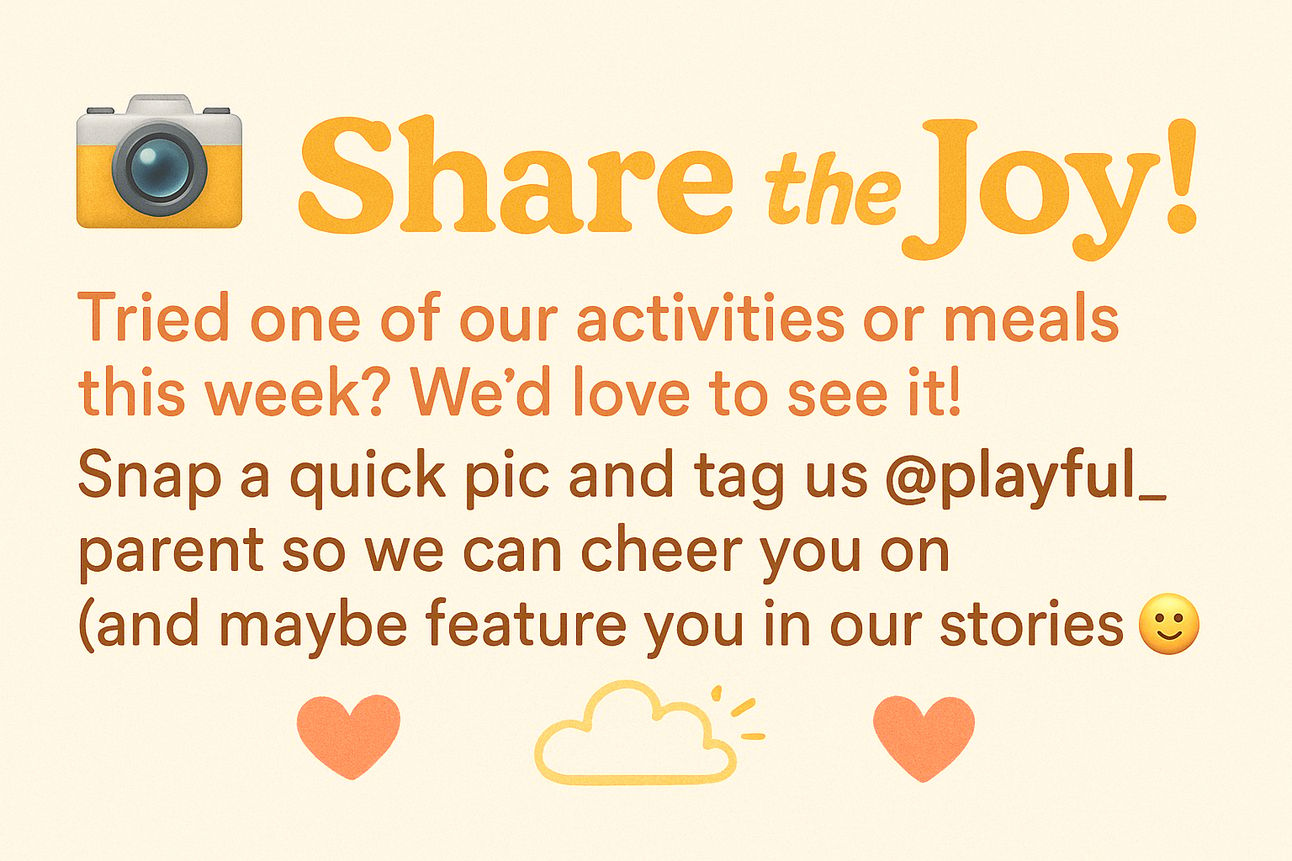
Join over 4 million Americans who start their day with 1440 – your daily digest for unbiased, fact-centric news. From politics to sports, we cover it all by analyzing over 100 sources. Our concise, 5-minute read lands in your inbox each morning at no cost. Experience news without the noise; let 1440 help you make up your own mind. Sign up now and invite your friends and family to be part of the informed.
Hey {{parent_name}}, here are some new activities to try out
💛 A Little Click Goes a Long Way
We carefully choose the ads in this newsletter to make sure they’re family-friendly and relevant. When you click on them, you’re helping keep Playful Parent free and thriving—so thank you for supporting us with just a tap or two!
Welcome to week 36 of Wonder Weeks: a year of creativity, curiosity and connections. ☀️ This Week’s Theme: My Voice Matters
Our children’s voices are powerful — not because they’re loud, but because they’re real. Every time a child says “That’s not fair,” or “I need help,” or “I don’t like that,” they’re practicing courage in its purest form.
This week, we’ll help kids discover how to use their voices to make things kinder, not just louder — to speak up for themselves and for others.
We’ll celebrate listening as much as talking, and explore how fairness, assertiveness, and empathy all grow from the same root: feeling heard.
When we model brave listening, we show our children that advocacy doesn’t have to be harsh — it can be gentle, just, and full of heart. 🌿

🌈 Let’s stay connected!
For daily tips, playful moments, and gentle reminders—we’re on social too.
Come say hi and join the cozy parenting community 💛
We would love to feature you!
👉 [@playfulparent] – come say hi!

Note: activities may be similar for kids of a similar age.

Activities
🌈 My Voice Matters
This week, we’re helping kids discover how powerful their voices can be — not just in volume, but in impact.
When children learn to speak up with kindness, they practice fairness, empathy, and confidence. Whether it’s saying, “That’s not fair,” or “I don’t like that,” these moments shape brave communicators who use their voices to make the world a little better.and connection.
1. 🎭 Kindness Role-Play Studio
Ages: 3–8 | Skills: Empathy, perspective-taking, communication
Materials: Stuffed animals, dolls, or puppets
How to Play:
Act out short scenes: one where someone’s feelings are hurt, one where someone helps.
Pause and ask, “What could we say to make it kind again?”
Let your child try different “voices of kindness.”
🧠 Why it Matters: Kids learn to notice fairness and use their voices to comfort and include others.
⬆️ Level Up: Write or draw “Kindness Comics” showing how characters speak up.
⬇️ Level Down: Use simple puppet play with short lines (“Stop.” “That’s kind.” “Can we help?”)
2. 💭 Voice Bubble Craft
Ages: 4–8 | Skills: Emotional awareness, expression, creativity
Materials: Paper, scissors, markers, tape
How to Play:
Cut out speech bubbles from paper.
Write or draw messages like “I can speak kindly,” “My voice matters,” “I can say no.”
Tape them around the house or make a “Wall of Voices.”
🧠 Why it Matters: Builds visual and emotional connection to using words thoughtfully.
⬆️ Level Up: Include “Listening Bubbles” too — things they can hear kindly (“I hear you,” “That must be hard”).
⬇️ Level Down: Use pictures or stickers instead of writing.
3. ⚖️ The Fairness Game
Ages: 5–9 | Skills: Critical thinking, fairness, empathy
Materials: Toys, snacks, or blocks
How to Play:
Give out items unequally (“You get 3, you get 1”).
Ask: “Is this fair? Why or why not?”
Try different scenarios — some fair, some equal — and talk through the difference.
🧠 Why it Matters: Teaches justice thinking and understanding others’ points of view.
⬆️ Level Up: Ask, “How could we make this fair in real life?”
⬇️ Level Down: Use snack sharing or toy sorting for tangible examples.
4. 🚂 Compliment Train
Ages: 3–7 | Skills: Positive communication, kindness, social awareness
Materials: None!
How to Play:
Sit in a circle or line.
The first person gives a compliment to the next (“I like how you helped clean up!”).
Keep it going until everyone’s heard something kind.
🧠 Why it Matters: Teaches children how to give verbal appreciation and see the ripple effect of words.
⬆️ Level Up: Add challenge cards (“Give a compliment about teamwork!”).
⬇️ Level Down: Use simple affirmations like “You’re kind,” “You’re fun,” “You’re my friend.”
5. 🛑 I Can Say “Stop” Practice
Ages: 3–8 | Skills: Assertiveness, boundary-setting, confidence
Materials: None
How to Play:
Practice using a confident but calm voice to say “Stop” or “No thank you.”
Role-play silly scenarios (tickle games, toy grabbing, pretend teasing).
Reinforce that their voice has power — and that others’ “stop” matters too.
🧠 Why it Matters: Builds self-advocacy and respect for others’ boundaries.
⬆️ Level Up: Have kids practice saying “I need help” or “That doesn’t feel right.”
⬇️ Level Down: Turn it into a simple “Stop & Freeze” dance game to practice tone of voice.
👶 Bonus Activities for Littles
1. 🎤 Echo Voices
Ages: 1.5–4 | Skills: Listening, imitation, emotional tone awareness
Materials: None
How to Play:
Say short kind phrases with fun emotion and rhythm (“I am kind!” “I can help!” “My voice matters!”).
Invite your child to echo your words in their own voice — whisper, shout, sing, or giggle it out!
Add gestures or actions to help meaning sink in (e.g., hands on heart for “I am kind”).
🧠 Why it Matters: Builds language, self-awareness, and the connection between words and emotions.
⬆️ Level Up: Have your child lead the phrases and let you echo them — giving them control over voice and tone.
⬇️ Level Down: Use single expressive sounds (“ah!” “oh!” “yay!”) to mirror tone and rhythm before full words.
2. 🧸 Puppet Peacemakers
Ages: 2–5 | Skills: Problem-solving, empathy, emotional labeling
Materials: Puppets or stuffed animals
How to Play:
Use two puppets to act out small, familiar conflicts (“Bear took Bunny’s block”).
Pause and ask, “What could Bunny say?” or “How can Bear make it kind again?”
Let your child move the puppets and try their own gentle words (“Stop,” “Let’s share,” “Sorry”).
🧠 Why it Matters: Helps children explore tricky social moments safely through play and practice using kind language before real-life situations happen.
⬆️ Level Up: Invite your child to invent their own short stories where characters use their voices to solve problems.
⬇️ Level Down: Model the interaction yourself with very simple lines (“Stop.” “Okay.” “Thank you.”) and exaggerated facial expressions.
🌙 Closing Reflection
Welcoming isn’t just something we say — it’s something our children feel in the daily rhythms of home. It’s in the way we listen to their stories, the space we make for their quirks, and the joy we show when they walk into the room.
When children know they are unconditionally welcome, they carry that safety into every corner of their lives. They become braver learners, kinder friends, and more compassionate neighbors. And perhaps most importantly, they grow up believing that difference is not a threat — it’s a gift.
By practicing welcome at home, we’re teaching our children the lesson the world most needs: that every person has a place, and every voice belongs. 🌈
What did you think of this week's activities?
Daily News for Curious Minds
Be the smartest person in the room by reading 1440! Dive into 1440, where 4 million Americans find their daily, fact-based news fix. We navigate through 100+ sources to deliver a comprehensive roundup from every corner of the internet – politics, global events, business, and culture, all in a quick, 5-minute newsletter. It's completely free and devoid of bias or political influence, ensuring you get the facts straight. Subscribe to 1440 today.


